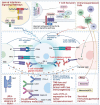Mechanisms of Anti-PD Therapy Resistance in Digestive System Neoplasms
- PMID: 38305306
- PMCID: PMC11865675
- DOI: 10.2174/0115748928269276231120103256
Mechanisms of Anti-PD Therapy Resistance in Digestive System Neoplasms
Abstract
Digestive system neoplasms are highly heterogeneous and exhibit complex resistance mechanisms that render anti-programmed cell death protein (PD) therapies poorly effective. The tumor microenvironment (TME) plays a pivotal role in tumor development, apart from supplying energy for tumor proliferation and impeding the body's anti-tumor immune response, the TME actively facilitates tumor progression and immune escape via diverse pathways, which include the modulation of heritable gene expression alterations and the intricate interplay with the gut microbiota. In this review, we aim to elucidate the mechanisms underlying drug resistance in digestive tumors, focusing on immune-mediated resistance, microbial crosstalk, metabolism, and epigenetics. We will highlight the unique characteristics of each digestive tumor and emphasize the significance of the tumor immune microenvironment (TIME). Furthermore, we will discuss the current therapeutic strategies that hold promise for combination with cancer immune normalization therapies. This review aims to provide a thorough understanding of the resistance mechanisms in digestive tumors and offer insights into potential therapeutic interventions.
Keywords: Immunotherapy resistance; PD-1/B7-H1; anti-PD-1/PD-L1 therapy; digestive system neoplasms; normalization cancer immunotherapy; pancreatic cancer..
Copyright© Bentham Science Publishers; For any queries, please email at epub@benthamscience.net.
Conflict of interest statement
The authors declare no conflict of interest, financial or otherwise.
Figures
Similar articles
-
Leveraging the synergy between anti-angiogenic therapy and immune checkpoint inhibitors to treat digestive system cancers.Front Immunol. 2024 Dec 3;15:1487610. doi: 10.3389/fimmu.2024.1487610. eCollection 2024. Front Immunol. 2024. PMID: 39691707 Free PMC article. Review.
-
Mechanisms of primary and acquired resistance to PD-1/PD-L1 blockade and the emerging role of gut microbiome.Clin Transl Oncol. 2021 Nov;23(11):2237-2252. doi: 10.1007/s12094-021-02637-2. Epub 2021 May 17. Clin Transl Oncol. 2021. PMID: 34002348 Review.
-
Siglec-15 as an Emerging Target for Next-generation Cancer Immunotherapy.Clin Cancer Res. 2021 Feb 1;27(3):680-688. doi: 10.1158/1078-0432.CCR-19-2925. Epub 2020 Sep 21. Clin Cancer Res. 2021. PMID: 32958700 Free PMC article. Review.
-
Study and analysis of antitumor resistance mechanism of PD1/PD-L1 immune checkpoint blocker.Cancer Med. 2020 Nov;9(21):8086-8121. doi: 10.1002/cam4.3410. Epub 2020 Sep 2. Cancer Med. 2020. PMID: 32875727 Free PMC article. Review.
-
Nanomicelle protects the immune activation effects of Paclitaxel and sensitizes tumors to anti-PD-1 Immunotherapy.Theranostics. 2020 Jul 9;10(18):8382-8399. doi: 10.7150/thno.45391. eCollection 2020. Theranostics. 2020. PMID: 32724476 Free PMC article.
References
-
- Rebecca L, Siegel MPH, Kimberly D, Miller MPH. Nikita Sandeep Wagle MBBS, M., PhD, Ahmedin Jemal DVM, PhD Cancer statistics, 2022;2023
Publication types
MeSH terms
Substances
Grants and funding
LinkOut - more resources
Full Text Sources
Research Materials




